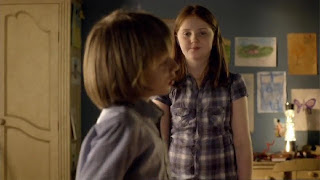HITLER: He was going to kill me...
RORY: Shut up, Hitler!
DOCTOR: Rory, take Hitler and put him in that cupboard over there.
Spoilers.
Like, seriously, spoilers. Let's Kill Hitler directly continues a story seeded in 2008 and threaded through three seasons. Every River Song episode leads to this one. And it's impossible to talk about this episode without referring to its many, many revelations.
But it's a good one. Not perfect, and yet another episode that should have been doubled in length, but fast, funny, clever, compelling, and, for the most part, satisfying.
 |
SPOILERS!
 |
| For example, this is the ending. |
As you'd expect from a Steven Moffat script, the characters and dialogue are top-notch. Rory gets all kinds of awesome moments ("Heil!"). Since neither the Doctor nor River tend to put all their emotions right on the surfact, Amy has to carry much of the emotion of the story, which Karen Gillan does beautifully. She also gets a great scene with the Sonic.
Okay, she does everything beautifully pretty much just by existing. But the point remains.
There's a brilliant montage of Amy, Rory, and Amy's friend Mels growing up. Storywise, it's there to retroactively establish Mel's history, but it's the stuff with Amy and Rory that's really wonderful here. Mels' insanity is a tad overblown, but still fun, and Amy makes a terrific straight man to her antics, both as a kid and grown up. But, again, Rory steals the scenes right from them.
RORY: I thought we were playing Hide and Seek. I've been hiding for hours!
AMY: Well... I just haven't found you yet.
RORY: Okay.
And the moment Amy decides to go after Rory could have been a sit-com moment, but it plays with such wit and sincerity that it delights instead.
Moffat has all manner of loopy ideas to carry the story, from the ingenious opening in the wheat field, to the Robot with miniature time travelers inside, to the entire subplot involving Hitler.
But this story is all about River. And, of course, the Doctor.
It starts with Mels, played with abandon by Nina Toussaint-White. She'd work a lot better if she had shown up or at the very least been mentioned before now, but Toussaint-White plays the hell out of her. It's a bit much in her last scene, but, for the most part, her completely unhinged performance works. On first watch, it's completely disorienting; on subsequent watches, it's extremely well thought through.
The twist about who she is may or may not be obvious, but it doesn't take away from the fun. Of course, it's only when she regenerates into the River we know that this really kicks into high gear.
Alex Kingston mesmerizes as the youngest River. All the spunk and eccentricity are there, but in a much more psychotic vision of the character. Kingston vividly captures this while making it unquestionably part of the character we've known the last several years.
Moffat weaves a fantastic tale of Melody's transformation into River. It is because of the Doctor, of course, but not because of any grand speech or epic gesture. It's simply his unstoppable desire to save his friends that leads her down the path to redemption. Her arc is superbly crafted.
Moffat also pulls off a wondrous trick: he builds an epic sci-fi/fantasy yarn full of resurrections, sacrifices, time travelers who "punish" those who got away with crimes, and tentacled robot guards who execute intruders very politely and quite violently...
... and climaxes the story essentially with a few quiet conversation. And it's fantastic. The Doctor's desperate attempts to stay alive just long enough to solve things packs a powerful punch, and his impact on River very moving, and nicely underplayed. Where A Good Man Goes To War emphasized the Doctor's darkness and fury, Let's Kill Hitler is his warmth, his mercy, his compassion.
And his whimsy. My word, is it about his whimsy. I don't think he's ever been more whimsical than during his slow, painful death with no hope of regeneration.
It's not really the second half of a single story, which is why I gave it its own entry, but as an examination of the Doctor's character, it's a perfect companion piece.
Let's Kill Hitler definitely has its flaws. Mels' regeneration plays a bit too casually with a major character's death; Murray Gold writes some lovely music for much of the story, but drowns several scenes in magnificent bombast that would be vastly more effective without music; director Richard Senior generally done a great job and certainly has an eye for visuals, but sometimes plays things too big and loud; and the whole story, again, could have been expanded to two parts to much greater effect. These elements dampen some of the story's potential emotion impact.
But it's a great story, full of joy, laughter, action, and deeply felt emotion. Beautifully acted, written, shot, and edited; it's a gem.
* * * ½
SIDENOTES:
- SONIC CANE!
- I love the Doctor's reaction to the TARDIS's various guises for his voice interface. Himself: "No, show me someone I like." Rose: "Guilt." Martha: "Also guilt." Donna: "More guilt! Isn't there anyone in the universe I haven't screwed up?"
- There's no end to the brilliant dialogue.
DOCTOR: Your room had a collision with my TARDIS. Fault on both sides. Say no more about it.
DOCTOR: I'm fine. Well, no, I'm dying. But I've got a plan.
AMY: What plan?
DOCTOR: Not dying.
RORY: Okay, I'm trapped inside a giant robot replica of my wife. I'm trying not to see this as a metaphor.
AMY: How can we be in here? How can we fit?
RORY: Miniaturization ray.
AMY: How do you know that?
RORY: Well, there was a ray, and we were miniaturized.


























No comments:
Post a Comment